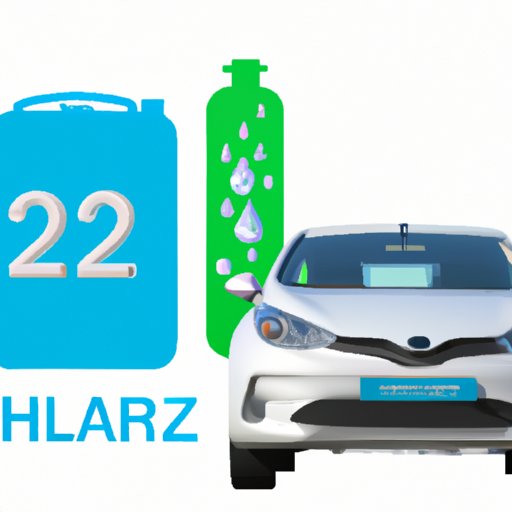Introduction
A hydrogen car is a type of vehicle that runs on an electric motor powered by a hydrogen fuel cell. Hydrogen cars are considered to be a more environmentally friendly alternative to traditional gasoline-powered vehicles, as they produce fewer emissions and can be refuelled in a fraction of the time. In this article, we’ll explore how a hydrogen car works, the various components that make up a hydrogen car, the efficiency of these vehicles compared to other types of vehicles, the cost and benefits of owning one, the various refuelling options available, and the current state of hydrogen car technology.

Explaining the Different Components of a Hydrogen Car
A hydrogen car consists of several different components that work together to power the vehicle. The most important component is the fuel cell, which converts chemical energy into electrical energy to power the electric motor. There are several different types of fuel cells used in hydrogen cars, including proton exchange membrane (PEM) fuel cells, solid oxide fuel cells (SOFCs), and direct methanol fuel cells (DMFCs).
The battery of a hydrogen car is also an important component, as it stores the electrical energy generated by the fuel cell. This stored energy is then used to power the electric motor when the driver needs additional power. The battery also helps to regulate the flow of energy from the fuel cell, ensuring that the electric motor receives the correct amount of power.
Examining the Role of Fuel Cells in Powering a Hydrogen Car
Fuel cells are the key component in powering a hydrogen car. A fuel cell works by converting chemical energy into electrical energy through a process called electrolysis. During electrolysis, hydrogen and oxygen react together to produce electricity and water. This electricity is then used to power the electric motor, allowing the car to move.
Fuel cells are much more efficient than traditional combustion engines, as they are able to convert more of the chemical energy into usable electricity. This means that hydrogen cars can travel further on a single tank of fuel than traditional gasoline-powered vehicles. Additionally, fuel cells do not produce any harmful emissions, making them a more environmentally friendly option.

Comparing the Efficiency of Hydrogen Cars to Other Types of Vehicles
Hydrogen cars are much more efficient than traditional gasoline-powered vehicles, as they are able to convert more of the chemical energy into usable electricity. Additionally, hydrogen cars produce significantly fewer emissions than traditional vehicles, making them a much more environmentally friendly option. This means that hydrogen cars have the potential to reduce air pollution and help to improve the quality of the air we breathe.
The efficiency of hydrogen cars is also greater than that of electric vehicles, as hydrogen cars are able to generate more power per unit of fuel. This makes them a more cost-effective option for long-distance travel, as they require less frequent stops for refuelling. Additionally, hydrogen cars are able to refuel much faster than electric vehicles, meaning that drivers do not have to wait as long to get back on the road.

Examining the Cost and Benefits of Owning a Hydrogen Car
The initial cost of purchasing a hydrogen car can be quite expensive, as the technology is still relatively new. However, the long-term savings associated with owning a hydrogen car can offset the initial expense. As hydrogen cars are more efficient than traditional gasoline-powered vehicles, drivers can save money on fuel costs over time. Additionally, as hydrogen cars produce fewer emissions, drivers may also be eligible for tax incentives or other government subsidies.
Exploring the Various Refuelling Options for Hydrogen Cars
Currently, there is limited availability of hydrogen refuelling infrastructure, as the technology is still relatively new. However, some countries have begun investing in the development of hydrogen refuelling stations, which will make it easier for drivers to refuel their cars. Additionally, research is being conducted into the possibility of home refuelling systems, which could potentially reduce the cost of owning a hydrogen car.

Investigating the Current State of Hydrogen Car Technology
The current state of hydrogen car technology is still in its early stages, as the technology has only recently begun to be developed. Additionally, there are still a number of challenges associated with advancing hydrogen car technology, such as improving the durability of the fuel cells and increasing the efficiency of the battery. Despite these challenges, the potential for hydrogen cars to revolutionize the automotive industry is clear.
Analyzing the Potential Impact of Hydrogen Cars on the Environment
The potential environmental impact of hydrogen cars is significant. As hydrogen cars produce fewer emissions than traditional vehicles, they have the potential to reduce air pollution. Additionally, switching from traditional fuels to hydrogen could reduce our reliance on fossil fuels, helping to reduce our carbon footprint.
Conclusion
Hydrogen cars offer many advantages over traditional gasoline-powered vehicles, including increased efficiency, reduced emissions, and long-term savings. Additionally, the current state of hydrogen car technology is still in its early stages, but there is potential for the industry to grow in the future. Finally, the potential environmental impact of hydrogen cars is significant, as they have the potential to reduce air pollution and help to reduce our reliance on fossil fuels.
(Note: Is this article not meeting your expectations? Do you have knowledge or insights to share? Unlock new opportunities and expand your reach by joining our authors team. Click Registration to join us and share your expertise with our readers.)
